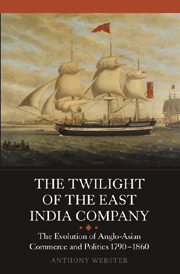 The Twilight of the East India Company
The Twilight of the East India Company Book contents
- Frontmatter
- Contents
- Preface
- 1 Introduction: The end of the East India Company, the historians and the evolution of Anglo-Indian commerce and politics
- 2 The origins of the East India Company and the rise of non-Company commercial interests in Britain, India and Asia, 1600–1793
- 3 War, politics and India: The battle for the East India Company trade monopoly, 1793–1813
- 4 Accommodating free trade: India, the East India Company and the commercial revolution of 1814–1830
- 5 Crisis and trade liberalisation 1830–1834: Financial chaos and the end of the East India Company's commercial role and privileges
- 6 Re-ordering Anglo-Asian commerce and politics: 1833–1847
- 7 Crisis, the resurgence of London and the end of the East India Company: 1847–1860
- 8 Conclusion: The decline of the East India Company and the evolution of British commercial and political interests in Asia, 1793–1860
- Notes
- Bibliography
- Index
3 - War, politics and India: The battle for the East India Company trade monopoly, 1793–1813
Published online by Cambridge University Press: 12 September 2012
- Frontmatter
- Contents
- Preface
- 1 Introduction: The end of the East India Company, the historians and the evolution of Anglo-Indian commerce and politics
- 2 The origins of the East India Company and the rise of non-Company commercial interests in Britain, India and Asia, 1600–1793
- 3 War, politics and India: The battle for the East India Company trade monopoly, 1793–1813
- 4 Accommodating free trade: India, the East India Company and the commercial revolution of 1814–1830
- 5 Crisis and trade liberalisation 1830–1834: Financial chaos and the end of the East India Company's commercial role and privileges
- 6 Re-ordering Anglo-Asian commerce and politics: 1833–1847
- 7 Crisis, the resurgence of London and the end of the East India Company: 1847–1860
- 8 Conclusion: The decline of the East India Company and the evolution of British commercial and political interests in Asia, 1793–1860
- Notes
- Bibliography
- Index
Summary
THE REFORM of the Company's trading practices under the Charter Act of 1793 represented a limited but significant success for non-Company commercial interests in Britain and India. The requirement that the Company provide 3,000 tons for private trade was an important victory because it recognised certain rights for those interested in the trade to India who were outside the East India Company. At the time, however, the achievement was seen by supporters of the Company as a modest and pragmatic response to the specific problem of the clandestine trade, and as a sop to the incoherent demands of provincial manufacturers and merchants. The reality was that the Company monopolies of trade with India and China remained intact, and senior politicians still regarded the Company as the best instrument through which to conduct commerce and political relations with the east, albeit with the safeguard of state supervision. The Company remained a formidable political and economic power. It was still, notwithstanding its financial difficulties of the 1770s and 1780s, a central pillar of the City of London. A phalanx of MPs was closely connected to the Company, and could be called upon to defend its interests. This was a valuable asset in a period of political instability in which party loyalties were flimsy, and the votes of key interests frequently essential for the survival of governments. In the immediate aftermath of 1793, leaders and defenders of the Company were reasonably confident that non-Company commercial interests had been largely placated, and would remain amenable in the future.
- Type
- Chapter
- Information
- The Twilight of the East India CompanyThe Evolution of Anglo-Asian Commerce and Politics, 1790–1860, pp. 39 - 63Publisher: Boydell & BrewerPrint publication year: 2009


